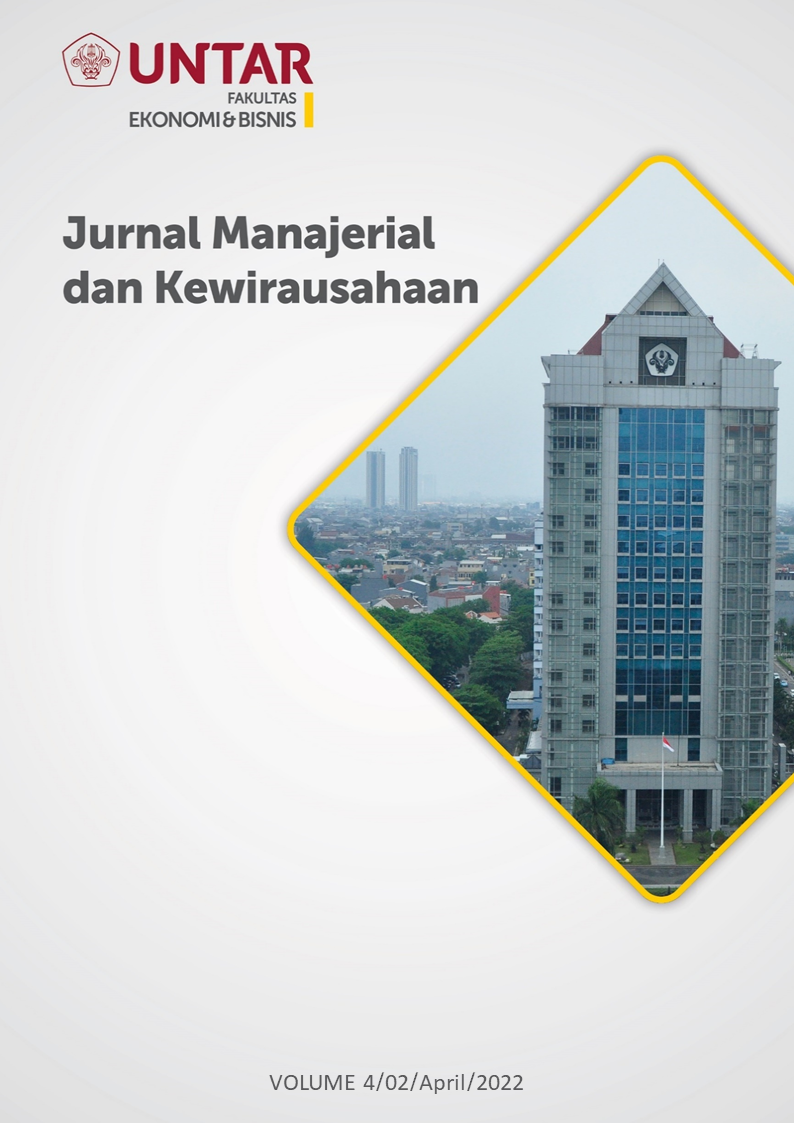Pengaruh Goal Setting Program, Pemberdayaan Karyawan, dan Self-Efficacy terhadap Kepuasan Kerja Karyawan
Main Article Content
Abstract
Dalam masa pandemi COVID-19 saat ini, banyak masyarakat yang kesulitan untuk mengakses layanan kesehatan seperti rumah sakit. Dengan kemajuan teknologi, saat ini mulai berkembang start-up yang bergerak di industri kesehatan. Start-up penyedia platform digital layanan kesehatan (healthtech) merupakan perusahaan yang menawarkan berbagai layanan untuk memudahkan seperti telekonsultasi dan pembelian produk kesehatan. Perusahaan mempunyai tujuan yang ingin dicapai dan tujuan ini dapat diraih dengan memaksimalkan potensi sumber daya manusia yang ada melalui peningkatan kepuasan kerja. Tujuan penelitian ini adalah untuk mengetahui pengaruh goal setting program, pemberdayaan karyawan, dan self-efficacy terhadap kepuasan kerja karyawan start-up healthtech di Jakarta. Peneliti menyebarkan kuesioner kepada karyawan yang bekerja di start-up healthtech di Jakarta yang berjumlah 70 responden. Metode analisa data dalam penelitian ini yaitu metode kuantitatif dengan menggunakan Structural Equation Modeling (SEM), melalui pendekatan Partial Least Square, Hasil penelitian ini menunjukkan pemberdayaan karyawan dan self-efficacy memiliki pengaruh positif dan signifikan terhadap kepuasan kerja sedangkan goal setting program memiliki pengaruh negatif dan tidak signifikan.
During the current COVID-19 pandemic, many people have difficulty accessing health services such as hospitals. With advances in technology, now start-ups are starting to develop in the healthcare industry. Start-up of digital health services (healthtech) platforms are companies that offer various services to facilitate such as teleconsultation and purchasing health products. The company has a goal to be achieved and this goal can be achieved by maximizing the potential of existing human resources through increasing job satisfaction. The purpose of this study was to determine the effect of goal setting program, employee empowerment, and self-efficacy on job satisfaction for healthtech start-up employees in Jakarta. Researchers distributed questionnaires to employees who work at healthtech start-ups in Jakarta, totaling 70 respondents. The data analysis method in this study is a quantitative method using Structural Equation Modeling (SEM), through a Partial Least Square approach. The results of this study show that employee empowerment and self-efficacy have a positive and significant effect on job satisfaction while the goal setting program has a negative and not significant.
Article Details
Section
This work is licensed under a Jurnal Muara Ilmu Ekonomi dan Bisnis Creative Commons Attribution-ShareAlike 4.0 International License.,/p>
References
Aritonang, R. L. R. (2008). Validitas dan Reliabilitas Butir Instrumen. Akademika Jurnal Pendidikan, 10(2), 159-180.
Bandura, A. (1986). Social foundations of thought and action : a social cognitive theory. New Jersey: Prentice-Hall, 16(1).
Bipp, T., & Kleingeld, A. (2011). Goal-setting in practice: The effects of personality and perceptions of the goal-setting process on job satisfaction and goal commitment. Personnel Review, 40(3). https://doi.org/10.1108/00483481111118630
Gogoi, K., & Baruah, P. (2021). Goal setting: Its impact on employee outcome. SCMS Journal of Indian Management, 18(1).
Haas, M. (2010). The double-edged swords of autonomy and external knowledge: Analyzing team effectiveness in a multinational organization. Academy of Management Journal, 53(5). https://doi.org/10.5465/amj.2010.54533180
Hair, J. F., Hult, G. T. M., Ringle, C. M., & Sarstedt, M. (2017). A Primer on Partial Least Squares Structural Equation Modeling (PLS-SEM). Second Edition. In California: Sage.
Hasibuan, M. S. P. (2011). Manajemen Sumber Daya Manusia. Edisi Revisi Jakarta: Bumi Aksara.
Idris, A., See, D., & Coughlan, P. (2018). Employee empowerment and job satisfaction in urban Malaysia: Connecting the dots with context and organizational change management. Journal of Organizational Change Management, 31(3). https://doi.org/10.1108/JOCM-04-2017-0155
Locke A., E., & Latham P., G. (2002). Building a Practically Useful Theory of Goal Setting and Task Motivation. American Psychologist, 57(9).
Na-Nan, K., Kanthong, S., & Joungtrakul, J. (2021). An empirical study on the model of self-efficacy and organizational citizenship behavior transmitted through employee engagement, organizational commitment and job satisfaction in the thai automobile parts manufacturing industry. Journal of Open Innovation: Technology, Market, and Complexity, 7(3). https://doi.org/10.3390/joitmc7030170
Nawawi, M., T. (2015). Pengaruh Kepuasan Kerja, Dan Motivasi Kerja Terhadap Kinerja Karyawan/ti Dengan Komitmen Organisasional Sebagai Variabel Intervening (Studi Karyawan Outsourcing PT. J Yang Ditempatkan Di Kampus II Untar Jakarta). Jurnal Manajemen Bisnis Indonesia, 3(1). https://doi.org/10.31843/jmbi.v3i1.75
Ren, S., & Chadee, D. (2017). Ethical leadership, self-efficacy and job satisfaction in China: the moderating role of guanxi. Personnel Review, 46(2). https://doi.org/10.1108/PR-08-2015-0226
Yusuf, M. (2011). The impact of self-efficacy, achievement motivation, and self-regulated learning strategies on students’ academic achievement. Procedia - Social and Behavioral Sciences, 15. https://doi.org/10.1016/j.sbspro.2011.04.158

